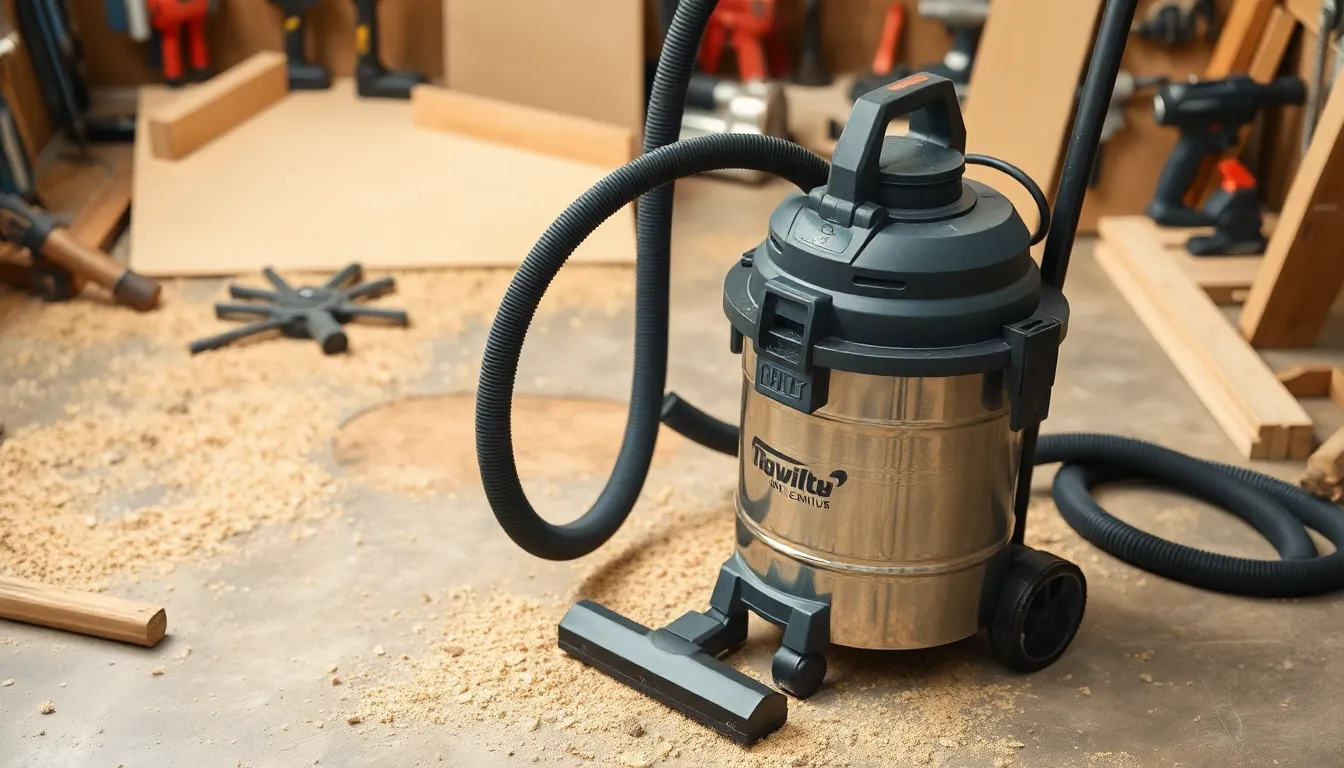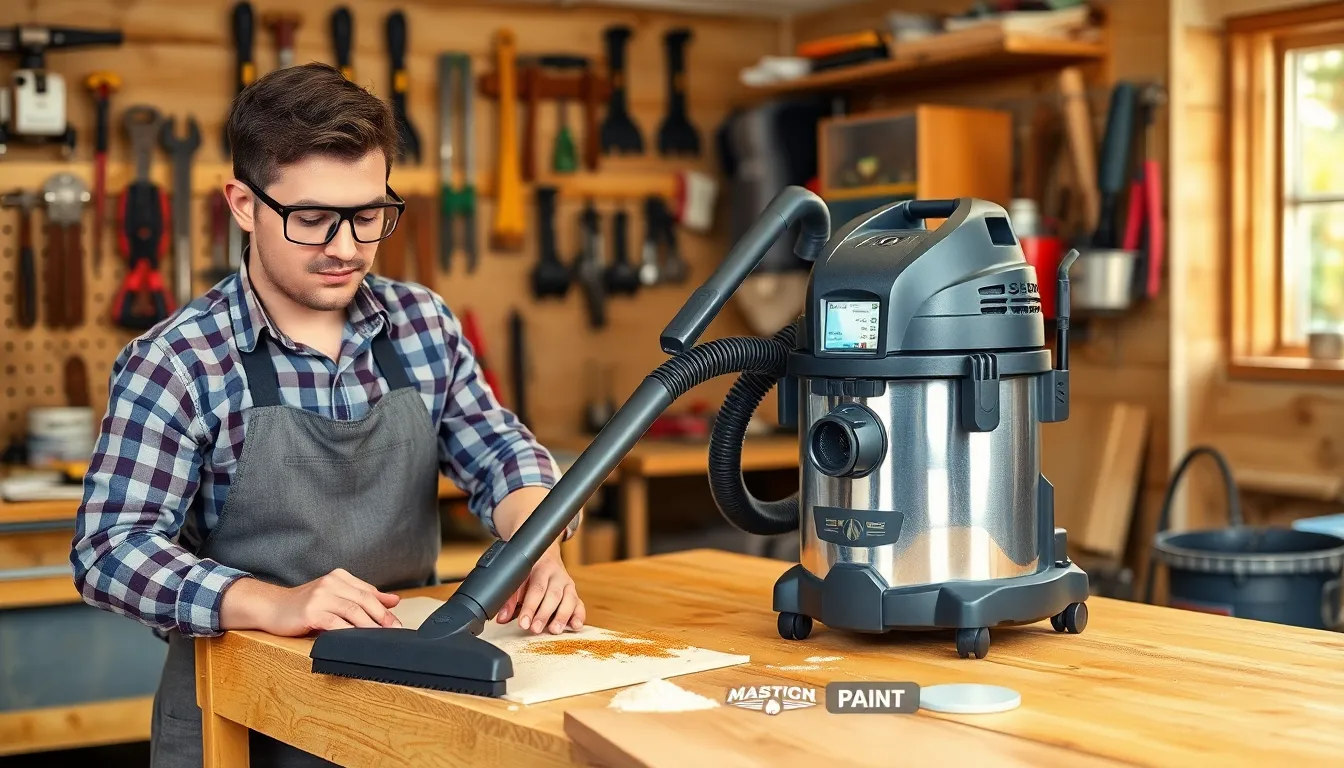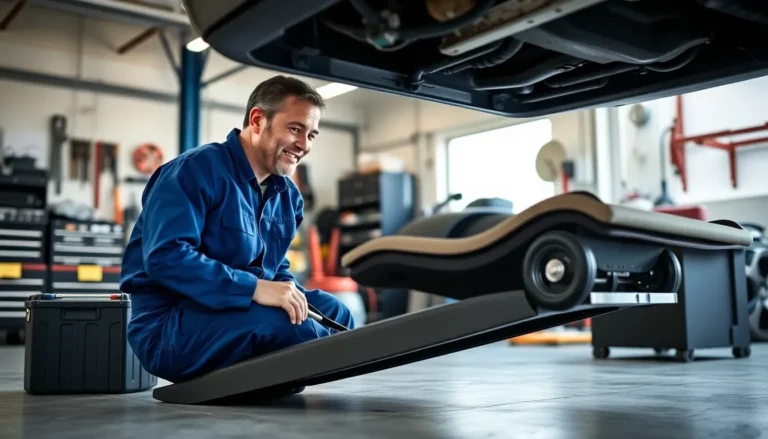When it comes to cleaning up after a DIY project or tackling those pesky messes, a shop vacuum cleaner is the unsung hero every workspace needs. Forget the dainty little vacuums that shy away from real challenges; a shop vacuum is built like a tank and ready to gobble up everything from sawdust to spilled paint. It’s the ultimate cleanup sidekick that doesn’t mind getting its hands dirty—because let’s be honest, who really enjoys sweeping up after a weekend of home improvement?
Table of Contents
ToggleOverview Of Shop Vacuum Cleaners
Shop vacuum cleaners serve a critical role in maintaining cleanliness in workspaces by effectively managing debris. They excel at handling various materials, including large particles like wood shavings or fine dust from power tools. Users appreciate their powerful suction capabilities, which make quick work of tough cleanup jobs.
Durability stands as a key feature of shop vacuums. Many models include robust construction materials, allowing them to withstand rigorous use in demanding environments. This resilience ensures longevity, making them a cost-effective solution for frequent tasks.
Versatility adds to their appeal. Shop vacuum cleaners often come equipped with various attachments, such as crevice tools and nozzle heads, tailored for specific cleaning needs. These accessories enhance functionality by enabling users to tackle different surfaces and larger debris.
Size and capacity vary across models. Smaller versions often weigh less, facilitating portability, while larger models provide substantial storage for collected debris. Many shop vacuums feature easy-to-empty containers, reducing downtime during projects.
Energy efficiency ranks high among advantages. Most shop vacuums operate on standard electrical outlets, making them accessible for widespread use. Some models incorporate advanced filtration systems to minimize allergens in the air while cleaning.
Safety functions remain essential for users. Several shop vacuums include features like automatic shutdown when full, preventing overflow and spillage. These designs ensure users can manage significant cleaning tasks with confidence.
Shop vacuum cleaners represent crucial tools for anyone engaged in DIY projects or maintenance tasks. Their reliability and performance make them indispensable in both residential and professional settings.
Key Features To Consider

Shop vacuum cleaners are essential for tackling tough messes. Evaluating key features is crucial for selecting the best model.
Power and Suction
Power significantly influences a shop vacuum’s performance. Higher wattage typically results in stronger suction, essential for managing heavy debris like sawdust and dirt. Models with variable speed settings allow users to adjust suction levels based on specific tasks. Checking for ample airflow measurements, often expressed in cubic feet per minute (CFM), further aids in identifying efficient options. Notably, some vacuums incorporate dual motors, enhancing overall suction strength.
Capacity and Size
Capacity plays a vital role in the usability of shop vacuums. Smaller models, ranging from 5 to 10 gallons, offer portability, ideal for quick cleanups. Larger units, with capacities exceeding 14 gallons, handle significant messes without frequent emptying. Considering the size, users should evaluate storage space and frequently clean areas to determine suitability. Wheels and handles contribute to maneuverability, making larger models easier to transport as needed.
Filter Types
Filter types significantly impact a vacuum’s efficiency and healthiness. HEPA filters, renowned for capturing fine dust and allergens, are perfect for individuals sensitive to particulates. Standard filters manage larger debris but might not perform well with fine particles. Selecting foam or wet/dry filters ensures versatility for liquid spills. Regular maintenance of filters improves suction power and extends the vacuum’s lifespan.
Top Shop Vacuum Cleaners Reviewed
Shop vacuum cleaners vary in features and performance. Each model targets specific cleaning tasks, making it crucial to choose the right one for your needs.
Model A: Features and Performance
Model A boasts a powerful motor with a suction capacity of 120 CFM. Portability is a highlight, weighing just 30 pounds, making it easy to maneuver. Users appreciate its built-in blower function, which expels debris effectively. The 16-gallon tank accommodates large messes, reducing frequent emptying. With a hose length of 7 feet and multiple attachments, it adapts well to different surfaces. Additionally, the reusable filter captures fine dust, promoting cleaner air quality.
Model B: Features and Performance
Model B offers versatility with a dual motor system, enhancing suction strength for heavy debris removal. This model features a 12-gallon storage tank, delivering sufficient capacity for medium to large cleanup tasks. Its cord length of 25 feet allows for extended reach without the need for multiple outlets. Various attachments, including a crevice tool and floor nozzle, ensure thorough cleaning. A HEPA filter contributes to allergen control, making it suitable for users with sensitivities. Durability is ensured with a tough outer casing designed for long-term use.
Model C: Features and Performance
Model C shines with its compact design, ideal for quick cleanups in tight spaces. This unit features a 10-gallon tank, sufficient for routine spills and debris. Suction power reaches 100 CFM, effectively managing moderate messes. It includes a 5-foot flexible hose and additional tools for specialized tasks. The washable filter simplifies maintenance, extending the vacuum’s lifespan. User-friendly controls enhance the cleaning experience, allowing for swift operation.
Comparing Shop Vacuum Cleaners
Evaluating shop vacuum cleaners involves assessing several key factors, such as price range and durability. These aspects influence both performance and long-term satisfaction.
Price Range
Shop vacuum cleaners typically range from $40 to $400. Budget models under $100 often suffice for light tasks while offering basic features. Mid-range options between $100 and $250 deliver more advanced capabilities, often including better suction power and additional attachments. High-end vacuum cleaners, priced over $250, excel in performance and often come with enhanced filtration systems. Investing in a quality model supports long-term usage and efficiency, making it essential to consider individual needs before purchasing.
Durability and Build Quality
Durability plays a crucial role in the selection of shop vacuum cleaners. Generally, models constructed from high-quality materials like polypropylene and steel last longer and withstand rigorous use. Many commercial-grade units feature reinforced casings to protect from impacts and environmental wear. Continuous heavy-duty performance often requires a vacuum that maintains structural integrity despite frequent use. High-quality models typically support longer warranties, further indicating their reliability. Choosing a vacuum known for its robust build ensures effective performance throughout years of demanding tasks.
Conclusion
Shop vacuum cleaners are invaluable for anyone tackling DIY projects or managing tough messes. Their powerful suction and durable construction make them ideal for a variety of tasks. With options available to suit different needs and budgets, users can find a model that fits their workspace perfectly.
The versatility of shop vacuums, from handling large debris to fine dust, ensures effective cleaning. Selecting the right model involves considering factors like power, capacity, and filter type. By investing in a quality shop vacuum, individuals can enhance their cleaning efficiency and maintain a tidy workspace for years to come.





